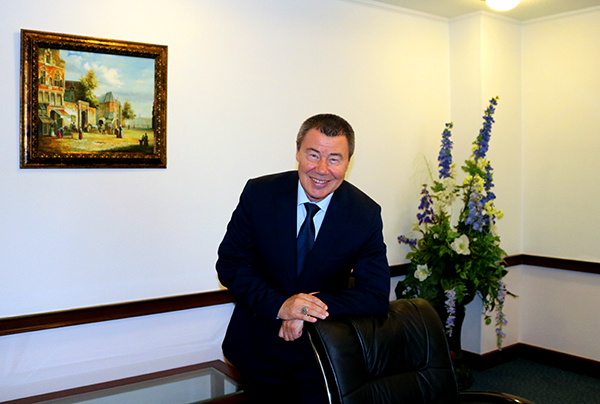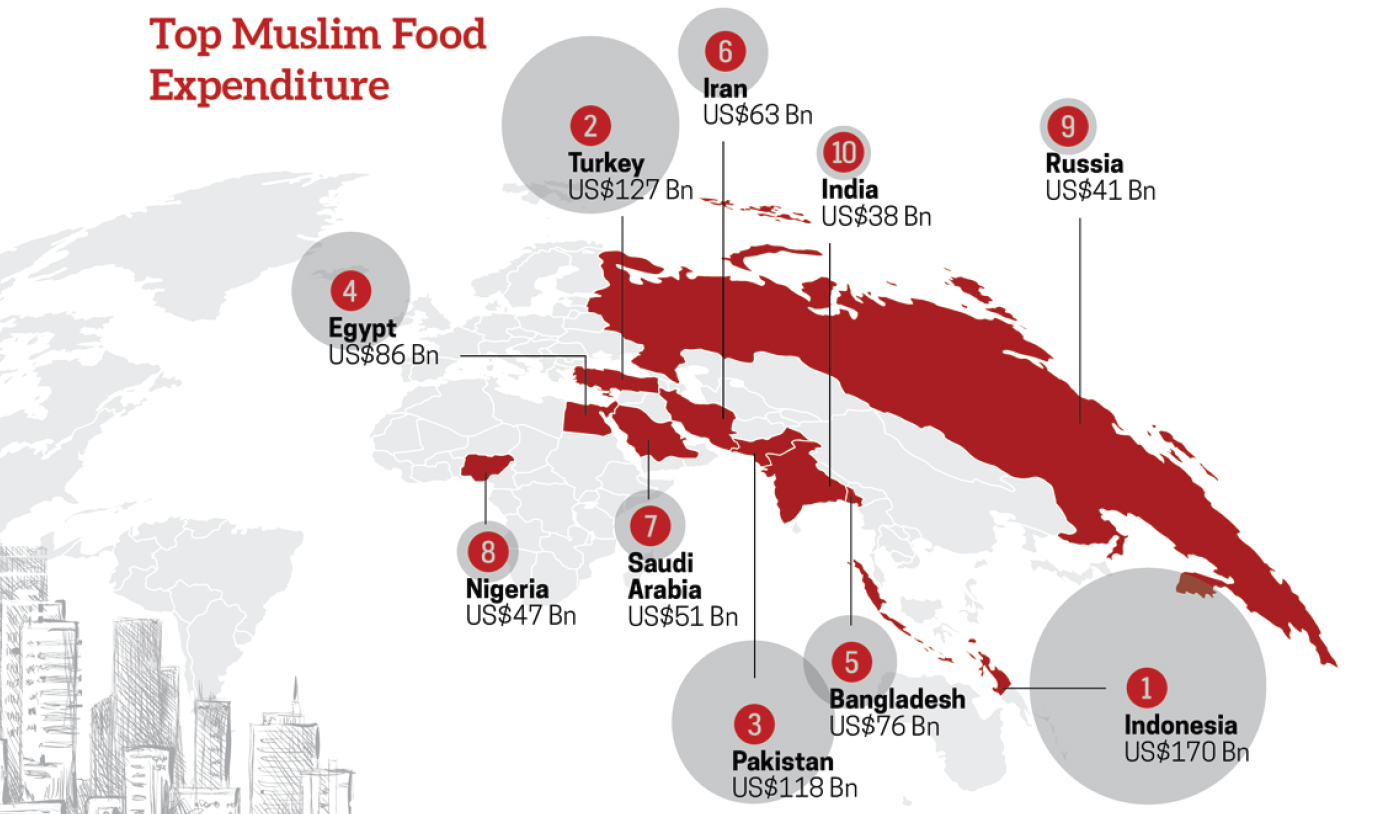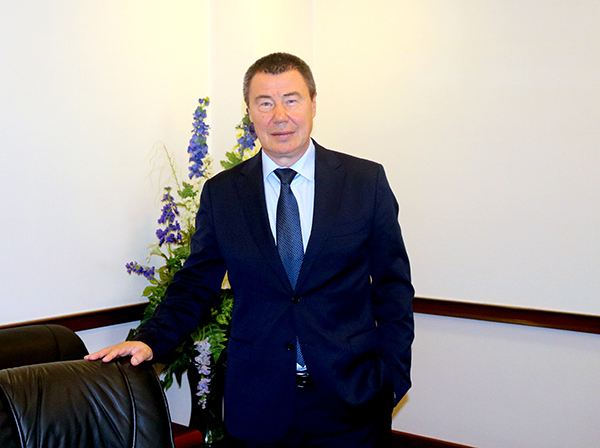[Dialogue] ‘The world is ready for Russian halal products’: IAIB’s chief Marat Kabaev

Marat Kabaev, the President of International Association of Islamic Business. Photo by IAIB.
In October Samara is hosting two large-scale international events: Volga Investment Summit and World Halal Day. Just before the event, Pan Pacific Agency talked to the President of the International Association of Islamic Business (IAIB) Marat Kabaev about what Russia has to offer on the market of halal products, and how large-scale international forums contribute to establishing a connection between producers and consumers of halal products and services.
Islamic business is unimaginable without following the halal standards. Does the Association you are in charge of, take any steps to get halal certification for their products?
– Our priority is to bridge the gap between Russian Islamic business and other countries: we have more than 40 offices in different Russian regions, and more than 20 in other countries of the world. The companies that are the Association members indeed vary in their areas of expertise – ranging from construction to Islamic finances and eco-projects. Sky is the limit for all different business areas that our Association has, excluding those that are prohibited by Islam, of course. Halal certification issues are vital for us, without doubt. The International Association of Islamic Business has a Halal Standard Committee. Murat Galeev presides there, having earlier worked in a similar committee of the Spiritual Board of Tatarstan Muslims. Our International Halal Certification Center has its official label for the approved products.
What Russian halal products or services have been recognized internationally?
– According to the international standards, Russia is ecologically safe, that is why our definite trump card in halal industry is agricultural products, mainly meat. Mutton, produced in the Russian Caucasus, is immensely popular, it is sold in large quantities. We know that Irani companies buy Russian meat to re-export it to the Persian Gulf countries, such as Qatar, Kuwait, Bahrain. Russian companies from many other areas, like halal beauty products, household chemicals, dairy products, have also entered the international halal market.
Can you name some particular brands?
– As for meat products, where I believe Russia to have no competition, there is Ekol Company, producing its halal goods in Domodedovo. The company supplies chicken to the United Arab Emirates. Amar Group Holding from Samara Region specializes in producing, processing and selling poultry under several brand names, such as the Russian Chicken brand sent for export.
Almost every poultry producer in Russia with at least 40 thousand tons of annual production offers several halal options, having a distinct packaging or labels. The biggest market players even launch new specialized trademarks both for the domestic market, such as Al Safa (Prioskolye), and for export – Noor (Resource Agricultural Group) and Dajajti (Cherkizovo). Halal poultry is widely used for sausages and gourmet products.
Actually, halal production can be developed and promoted in various spheres. An increasing number of people, and not all of them are Muslim, want to eat healthy food. So it is not all about religion.
Many experts believe halal market to become a truly global phenomenon that is not just religiously based anymore. What are the estimates on the halal industry growth rates?
– According to the Global Islamic Economic Report 18/19, that is prepared annually by Thompson Reuters, the Islamic business market share was about $2.107 trillion in 2017. By 2023 this share will exceed $3 trillion. The same data suggest that halal standard products cost $1.3 trillion in 2017, and by 2023 the number could exceed $1.86 trillion. The largest halal market today is Indonesia ($170 billion), Russia takes the 9th place with $41 billion.

Do we have strong competition in the foreign market? How can we dominate there?
– International market is largely dominated by the halal meat produced in non-Muslim countries – Brazil, Australia, New Zealand. Brazil is especially exemplary here, since many companies there, such as Sadia that has been world-renowned since 1944, produce halal products in large quantities and supply them to different countries of the world.
Nevertheless, Russian products are still in demand. As I have mentioned before, Irani companies buy a lot of meat in Dagestan. We now are negotiating to start shipments from Kalmykia that has a significant amount of livestock and all necessary premises to develop halal export. Therefore, what we need is to keep working, meeting, communicating and establishing new contacts.
Even more so, since Russian halal meat and dairy is much better in quality than what the current market offers, and it is not just my personal opinion. The best example of that is doing business with a company that sells meat from Sudan and New Zealand to Saudi Arabia. Local market started showing lower demand for this product due to its poor taste quality. So they bought a batch of mutton and chicken in Russia. The importer liked the products so much that now they are in the middle of getting a license for importing Russian meat.
How did Saudi Arabia discover that Russian meat is so good?
– We need to improve our communication with colleagues in different conferences, forums, go abroad. Large producers have realized that a long ago and started presenting their products at the exhibitions in the United Arab Emirates and other countries. Tatarstan has already been hosting Russia — Islamic world: KazanSummit for ten years, showcasing halal products from all over the world. World Halal Day, that Russia is going to celebrate for the first time in October of this year, is another great opportunity for Russian producers to advertize their products to the world.
Let me give you another example of how profitable these meeting can turn out. Last year we together with Sberbank and Islamic Bank held the first Islamic Finances forum. This event was not a perfunctory one, we are really concerned with creating all necessary conditions to provide funds for our compatriots, Russian guests, investors, based on halal standards that forbid loans with interest.
We held the forum, organized round tables together with Sberbank and State Duma, set up a “project team”. So this September the Plekhanov Russian University of Economics launched a new major in Islamic Finances for full-time and part-time students. I was the first to apply, because it is never too late to learn. We plan another forum for November 22.

Do you feel the government support of the Association initiatives?
– Overall, the government is interested in supporting halal producers. There are about 30 million Muslims in Russia, and an increasing number of people, arriving here from the Muslim world. For instance, we see a growing number of tourists from Saudi Arabia. This indicates improvement of halal infrastructure: more and more hotels, restaurants and cafes introduce halal menus, provide accommodation according to the halal standards. There are international companies, planning to start construction of halal hotels in Russia. Such infrastructure means having additional client base and additional income for businesses and the state. The more attention our government is ready to give to the halal issue, the more profitable it would turn out for the country.
What else can the government do for halal producers, in your opinion?
– Certification is an important issue here. Now the Federal Agency for Technical Regulation and Metrology has registered a certification board for Halal products and services. It is developing a national standard for halal products to be used by certification bodies throughout the country. This is a major advantage and support for the halal industry, since a unified standard would facilitate the export of Russian products.
Is it difficult without a national halal standard?
– So far, you have been required to certify your halal products according to the standards of the country you plan on supplying them to. In order to have this certification, you need to be registered with a national developer and controller of halal standards. This is a very expensive process that can cost up to tens of thousands of dollars. When our Rosstandard committee develops the national halal standard that would be internationally recognized – and we hope this to happen very soon – Russian producers will only need to follow this standard to a T.
You have mentioned Arabic countries several times today, and it is understandable since they are closer to us geographically. What is the situation for the Muslim states of the Asian Pacific Region, such as Indonesia and Malaysia?
– Malaysia is a current leader, based on the last issue of Global Islamic Economy Indicator, published as a part of the Global Islamic Economic Report. Despite being a country with the largest Muslim population, Indonesia is only 10th, but it is second in the list of halal (conservative) clothing industry and fourth in halal tourism. Many other Asian Pacific countries, including Bangladesh, Sri Lanka, Singapore, Brunei, are top-10 in many different halal industries.
Recently we have visited Malaysia. There is demand for our products, moreover, many companies will take part in the Halal Expo during the Volga Investment Summit and World Halal Day in Samara.
At the first glance, importing goods from Russia to the Asia Pacific Region is expensive because of the distance factor. But it is debatable, since Brazil sends its goods all over the world, for instance. The most important thing here is to look into experience of other businesses. And there are lots of them to learn from. In the mid-November we are going to Brazil to meet the spokesperson of the Association in Latin America and hold some events with representatives of Muslim countries with well-developed halal industries. The more communication we have with each other, the more we learn from each other, the easier it would be for everyone to have productive business cooperation.
Interviewer: Dmitrii Shcherbakov – Pan Pacific Agency’s Managing Partner, Editor-in-Chief.
Russian version of this article is available here.